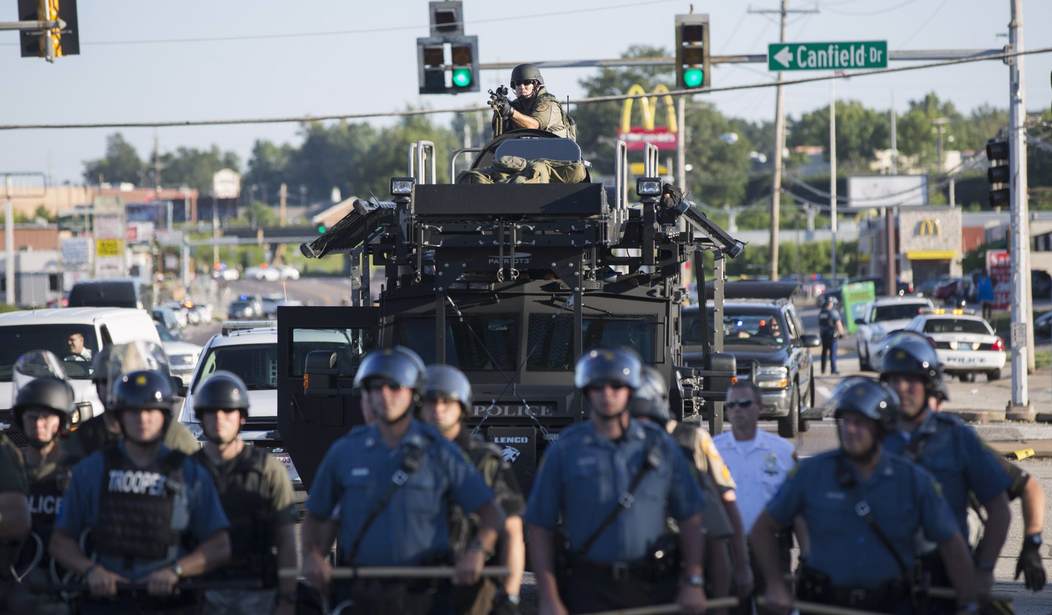Protesters marching in the streets of Ferguson, Mo., since the death of Michael Brown may have scored a major victory with the announcement of “sweeping changes” to the city’s court system.
“As an activist you are going to stay mad because you are not going to always get all that you want,” Patricia Bynes, the Ferguson Township Democratic committeewoman, told CNN.
“But because of the pushing and the pressure that protesters put on Ferguson, I am considering it a win and a very big win. It’s an olive branch.”
Critics of the city’s administration had long complained of a municipal court system stacked against low-income and especially African-American residents that wielded unchecked power to issue enormous fines and jail time for minor offenses like traffic violations.
Missouri Gov. Jay Nixon (D) pointed to the case of one woman who spent more than 30 days in jail because of a 15-year-old unpaid parking ticket she received as a teenager. She couldn’t pay the fine in full and set up a payment plan. When the woman missed one payment, Ferguson police issued a warrant for her arrest. Years later, she was put in handcuffs during a traffic stop and jailed.
Thomas Harvey, one of the leaders of the organization Arch City Defenders, told the St. Louis Post-Dispatch Ferguson court officials had “made it illegal to be poor.”
A Justice Department civil rights investigation concurred with those allegations in March. The department’s report cited a “pattern and practice” of discrimination by the Ferguson Municipal Court and the city’s police department against African-Americans.
The report showed even though two-thirds of the St. Louis suburb’s 21,000 residents are black, 95 percent of the people charged with walking in the street and 92 percent of people charged with disturbing the peace were African-American.
In an effort to reverse years of inequity, Ferguson Municipal Court Judge Donald McCullin, appointed to the bench in June 2015, announced Aug. 24 that all arrest warrants issued before Dec. 31, 2014, would be withdrawn.
Stephanie Karr, municipal prosecutor for Ferguson, said this order could affect close to 10,000 arrest warrants.
McCullin also issued an order changing the conditions for pre-trial release so that defendants who could not make bond for relatively minor offenses wouldn’t have to stay in jail.
McCullin decided Ferguson residents whose drivers’ licenses were suspended only because they had failed to appear in court or were unable to pay a fine will now have those licenses reinstated pending a final disposition of their cases. McCullin said they should be able to “take advantage of the benefits of being able to drive.”
McCullin said defendants would now be given new court dates along with alternative ways to dispose of the charges against them instead of jail time. Those options include payment plans, community service, “and/or commuting fines for indigent persons.”
“These changes should continue the process of restoring confidence in the Court, alleviating fears of the consequences of appearing in Court, and giving many residents a fresh start,” McCullin said in a statement.
“The Ferguson City Council applauds the recall of the arrest warrants and the rescission of the drivers’ license suspensions,” said Mayor James Knowles, “as a way to restore confidence in the Municipal Court.”
McCullin’s order goes beyond the municipal court reform legislation in effect across Missouri Aug. 28: Senate Bill 5, which was inspired by the municipal court system complaints and riots in Ferguson.
Gov. Nixon said the Ferguson Municipal Court was not the only judicial body profiting off the poor in his state when he signed Senate Bill 5 in July.
“Some municipal courts were operating to raise revenue rather than to serve justice – and often doing so on the backs of those who were least able to pay,” Nixon said. “Friends, our court system exists to protect the safety of our citizens, not profit from them.”
At least one group doesn’t think Judge McCullin has gone far enough.
“There are real questions about the legitimacy of the stops in the first place brought up by the DOJ and Arch City Defenders as well,” Arch City Executive Director Thomas Harvey said.
“If they want to do something in the interest of community healing they should just get rid of those cases. Blank slate. Start over. And move on.”
Harvey also pointed out McCullin will have to retire in six months because of Missouri’s age limit for judges. Harvey fears Ferguson will go back to where it was before the McCullin order when the judge steps down.
At the heart of his reluctance to celebrate McCullin’s order seems to be a hesitancy to believe it is real.
“You’re asking the community to trust you,” Harvey told CNN, “after years of creating distrust.”









Join the conversation as a VIP Member